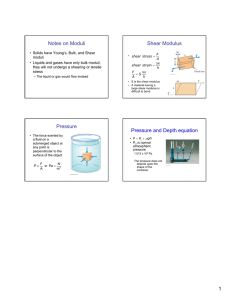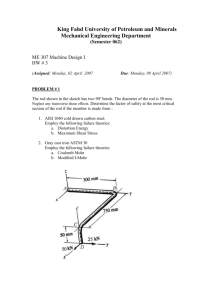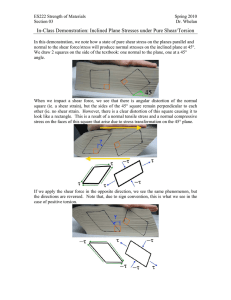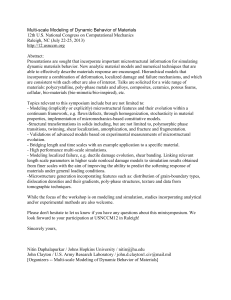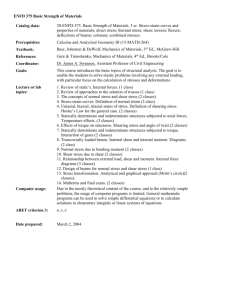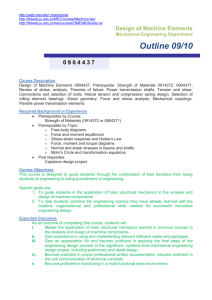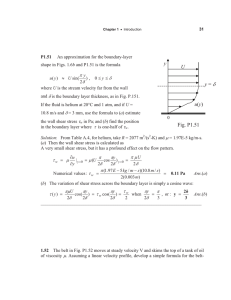OUTCOME PhD position in Marie Skłodowska-Curie ITN-ETN
advertisement
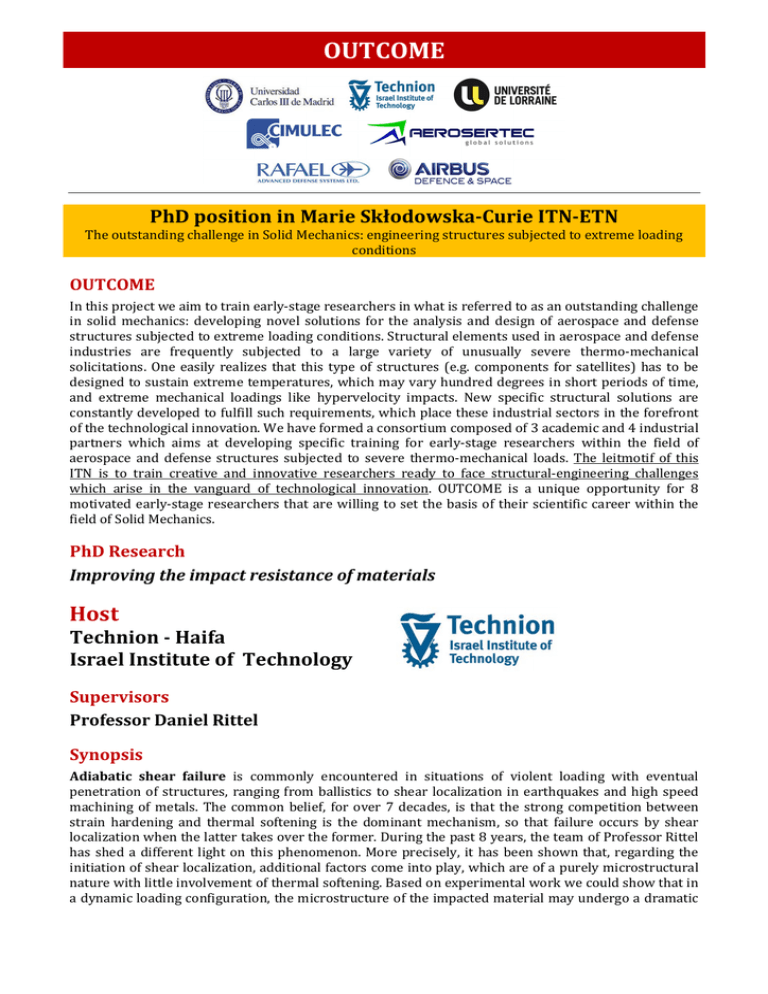
OUTCOME PhD position in Marie Skłodowska-Curie ITN-ETN The outstanding challenge in Solid Mechanics: engineering structures subjected to extreme loading conditions OUTCOME In this project we aim to train early-stage researchers in what is referred to as an outstanding challenge in solid mechanics: developing novel solutions for the analysis and design of aerospace and defense structures subjected to extreme loading conditions. Structural elements used in aerospace and defense industries are frequently subjected to a large variety of unusually severe thermo-mechanical solicitations. One easily realizes that this type of structures (e.g. components for satellites) has to be designed to sustain extreme temperatures, which may vary hundred degrees in short periods of time, and extreme mechanical loadings like hypervelocity impacts. New specific structural solutions are constantly developed to fulfill such requirements, which place these industrial sectors in the forefront of the technological innovation. We have formed a consortium composed of 3 academic and 4 industrial partners which aims at developing specific training for early-stage researchers within the field of aerospace and defense structures subjected to severe thermo-mechanical loads. The leitmotif of this ITN is to train creative and innovative researchers ready to face structural-engineering challenges which arise in the vanguard of technological innovation. OUTCOME is a unique opportunity for 8 motivated early-stage researchers that are willing to set the basis of their scientific career within the field of Solid Mechanics. PhD Research Improving the impact resistance of materials Host Technion - Haifa Israel Institute of Technology Supervisors Professor Daniel Rittel Synopsis Adiabatic shear failure is commonly encountered in situations of violent loading with eventual penetration of structures, ranging from ballistics to shear localization in earthquakes and high speed machining of metals. The common belief, for over 7 decades, is that the strong competition between strain hardening and thermal softening is the dominant mechanism, so that failure occurs by shear localization when the latter takes over the former. During the past 8 years, the team of Professor Rittel has shed a different light on this phenomenon. More precisely, it has been shown that, regarding the initiation of shear localization, additional factors come into play, which are of a purely microstructural nature with little involvement of thermal softening. Based on experimental work we could show that in a dynamic loading configuration, the microstructure of the impacted material may undergo a dramatic OUTCOME refinement (dynamic recrystallization – DRX), which turns to be a local softening factor. It is the nucleation, growth and coalescence of those DRX’ed islands in the material that ultimately results in the formation of a shear band. The main goal of this thesis is the development of a constitutive model, backed up with experiments specifically designed for this purpose, to describe the observed phenomena and develop a better understanding of what should be done to control the process of dynamic recrystallization. Research outputs A new constitutive model to describe microstructural evolutions that, under impact loading, cause the formation of shear bands and subsequent material failure. The novelty of this research is the systematic investigation of potentially toughening factors, developing a constitutive model to understand (and then to control) the development of microstructural evolutions like dynamic recrystallization. In due time, this investigation should provide guidelines for developing tougher materials, suitable to sustain extreme shear loads. Multidisciplinary / intersectoral research approach: The ESR will develop at the TECHNION an experimental campaign of unprecedented magnitude to show the interplay between dynamic recrystallization and shear bands inception in different engineering ductile materials. Moreover she/he will conduct a secondment at the University of Lorraine where she/he will develop the core of a constitutive model to describe the interplay between microstructure and shear localization. Additionally the ESR will conduct a research period in Spain during which she/he will visit the University Carlos III of Madrid and AEROSERTEC. At the University Carlos III of Madrid he/she will implement the constitutive model into ABAQUS. In AEROSERTEC she/he will identify, analyze and model real applications in which dynamic ductile failure causes the loss of load carrying capacity of aerospace and defense structures. Training activities The successful candidate will have access to the PhD program of the TECHNION as well as to the training activities organized within the OUTCOME consortium. These activities include, among others: • • • • • • Attendance to the Workshop: Extreme structural mechanics in aerospace applications to be organized by AEROSERTEC in Madrid. Attendance to the Workshop: Extreme structural mechanics in defense applications to be organized by RAFAEL in HAIFA. Attendance to the course: Horizon 2020 Proposal Development to be organized by EUROPA Media in Budapest. Attendance of the course: Damage and failure of solids subjected to extreme loading conditions to be organized by the University of Lorraine. Attendance to the course: From PhD to Scientific Leadership to be organized by Yellow Research in Madrid. Attendance to prestigious international conferences on damage and failure of engineering materials. OUTCOME Benefits The successful candidate will be employed for 3 years and receive a financial package plus an additional mobility and family allowance according to the rules for Early Stage Researchers (ESRs) in an EU Marie Skłodowska-Curie Actions Innovative Training Networks (ITN): • • • Living allowance – 3380.57 € (per month) Mobility allowance – 600€ (per month) Family allowance – 500€ (per month – if applicable) This amount is a gross contribution to the salary costs. Net salary will result from deducting all compulsory social security/direct taxes from the gross salary according to the law applicable to the agreement concluded with the ESR. Additional information about the funding provided by the ITN projects can be found in: http://ec.europa.eu/research/participants/data/ref/h2020/wp/2014_2015/main/h2020-wp1415-msca_en.pdf Key publications Rittel D., Wang Z. G., Merzer M. Adiabatic shear failure and dynamic stored energy of cold work. Physical Review Letters. 2006; 96: 075502. Rittel D., Wang Z. G. Thermo-mechanical aspects of adiabatic shear failure of AM50 and Ti6Al4V alloys. Mechanics of Materials. 2008; 40: 629-635. Rittel D., P. Landau P, Venkert A. Dynamic recrystallization as a potential cause for adiabatic shear failure. Physical Review Letters. 2008; 101: 165501. Rittel D. A different viewpoint on adiabatic shear localization. Journal of Physics D. Applied Physics. 2009; 42: 214009. Landau P., Venkert A., Rittel D. Microstructural aspects of adiabatic shear failure in annealed Ti6Al4V. Metallurgical and Material Transactions A. 2010; 41: 389-396. Rittel D., Osovski, S. Dynamic failure by adiabatic shear banding. International Journal of Fracture. 2010; 162: 177-185. Dolinski M., Rittel D. Dorogoy A. Modeling dynamic shear failure from energy considerations. Journal of the Mechanics and Physics of Solids. 2010; 58: 1759-1775. Osovski S., Rittel D., Landau P., Venkert P. Microstructural effects on adiabatic shear band formation. Scripta Materialia. 2012; 66: 9-12. Osovski S., Nahmany Y., Rittel D., Landau P., Venkert A. On the dynamic character of localized failure. Scripta Materialia. 2012; 67:693-695. Osovski S., Rittel D. Microstructural heterogeneity and dynamic shear localization. Applied Physics Letters. 2012; 101: 211901. Osovski S. Rittel D., Venkert A. The respective influence of microstructural and thermal softening on adiabatic shear localization. Mechanics of Materials. 2013; 56: 11-22. OUTCOME Profile We are looking for highly motivated early-stage researchers with the following profile: • Hands-on mentality, good organizational and communication skills. • Proactive attitude and ability to work both independently/autonomously and within a team. • Excellent communication skills in English. In order to meet the specific requirements of the Marie Skłodowska-Curie funded PhDs, you must not have resided or carried out your main activity (work, studies, etc.) in Israel for more than 12 months in the last 3 years. You may be of any Nationality. Required educational level Degree Degree field Master degree or equivalent Engineering: civil, mechanical, aerospace Degree Degree field Master degree or equivalent Physics Career stage Early stage researcher or 0-4 years (Post graduate) Professional and/or research experience We will particularly consider those candidates with proven experience in technological and/or research activities. Publication/s in journals indexed in the Journal of Citation Reports will be especially welcomed Letter of motivation The candidates must provide a letter of motivation where they clearly state why, under their point of view, they should be enrolled in OUTCOME. References At least, one recommendation letter from the scientist/s who mentored the candidate during her/his master studies is required. The letter must clearly expose the profile of the candidate with emphasis in the qualities which make her/him suitable for being recruited in OUTCOME. Additional recommendation letters from any other professor/professional will be most welcomed. Specific qualifications Candidates should have a solid background in Solid Mechanics, Experimental Mechanics, Materials Science, Numerical Modeling. Knowledge in electron microscopy is an advantage. OUTCOME Flexible working conditions We are committed to provide flexible hours and home working conditions for researchers having family obligations. The following web-site contains relevant information related to the EU equal opportunities policy https://ec.europa.eu/research/science-society/women/wir/index_en.html. Moreover, the web-site http://www.partnerjob.com/ facilitates geographic mobility by providing help to find a job for an accompanying partner. OUTCOME Contact details Professor Daniel Rittel Faculty of Mechanical Engineering. Israel Institute of Technology. TECHNION 3200. Haifa, Israel. E-mail address: merittel@me.technion.ac.il Phone number +972 77 887 3261 Professor José A. Rodríguez-Martínez – Project Coordinador Department of Continuum Mechanics and Structural Analysis. University Carlos III of Madrid Avenida de la Universidad 30. CP 28911. Leganés (Madrid), Spain. E-mail address: jarmarti@ing.uc3m.es Phone number +34 91 624 9904 The application period closes in June 2016 The PhD starts in September 2016
